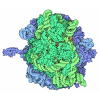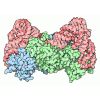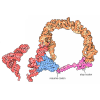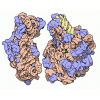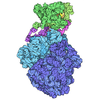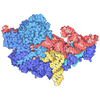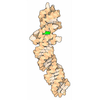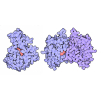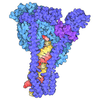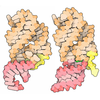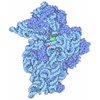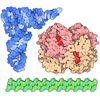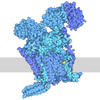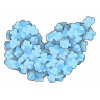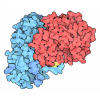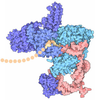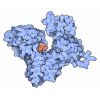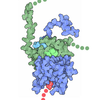[English] 日本語
 Yorodumi
Yorodumi- PDB-4d5y: Cryo-EM structures of ribosomal 80S complexes with termination fa... -
+ Open data
Open data
- Basic information
Basic information
| Entry | Database: PDB / ID: 4d5y | |||||||||
|---|---|---|---|---|---|---|---|---|---|---|
| Title | Cryo-EM structures of ribosomal 80S complexes with termination factors and cricket paralysis virus IRES reveal the IRES in the translocated state | |||||||||
 Components Components |
| |||||||||
 Keywords Keywords | RIBOSOME / CRPV IRES / TERMINATION / RELEASE FACTORS | |||||||||
| Function / homology |  Function and homology information Function and homology informationcytosolic large ribosomal subunit / cytoplasmic translation / rRNA binding / structural constituent of ribosome Similarity search - Function | |||||||||
| Biological species |  | |||||||||
| Method | ELECTRON MICROSCOPY / single particle reconstruction / cryo EM / Resolution: 9 Å | |||||||||
 Authors Authors | Muhs, M. / Hilal, T. / Mielke, T. / Skabkin, M.A. / Sanbonmatsu, K.Y. / Pestova, T.V. / Spahn, C.M.T. | |||||||||
 Citation Citation |  Journal: Mol Cell / Year: 2015 Journal: Mol Cell / Year: 2015Title: Cryo-EM of ribosomal 80S complexes with termination factors reveals the translocated cricket paralysis virus IRES. Authors: Margarita Muhs / Tarek Hilal / Thorsten Mielke / Maxim A Skabkin / Karissa Y Sanbonmatsu / Tatyana V Pestova / Christian M T Spahn /   Abstract: The cricket paralysis virus (CrPV) uses an internal ribosomal entry site (IRES) to hijack the ribosome. In a remarkable RNA-based mechanism involving neither initiation factor nor initiator tRNA, the ...The cricket paralysis virus (CrPV) uses an internal ribosomal entry site (IRES) to hijack the ribosome. In a remarkable RNA-based mechanism involving neither initiation factor nor initiator tRNA, the CrPV IRES jumpstarts translation in the elongation phase from the ribosomal A site. Here, we present cryoelectron microscopy (cryo-EM) maps of 80S⋅CrPV-STOP ⋅ eRF1 ⋅ eRF3 ⋅ GMPPNP and 80S⋅CrPV-STOP ⋅ eRF1 complexes, revealing a previously unseen binding state of the IRES and directly rationalizing that an eEF2-dependent translocation of the IRES is required to allow the first A-site occupation. During this unusual translocation event, the IRES undergoes a pronounced conformational change to a more stretched conformation. At the same time, our structural analysis provides information about the binding modes of eRF1 ⋅ eRF3 ⋅ GMPPNP and eRF1 in a minimal system. It shows that neither eRF3 nor ABCE1 are required for the active conformation of eRF1 at the intersection between eukaryotic termination and recycling. | |||||||||
| History |
| |||||||||
| Remark 700 | SHEET DETERMINATION METHOD: DSSP THE SHEETS PRESENTED AS "BA" IN EACH CHAIN ON SHEET RECORDS BELOW ...SHEET DETERMINATION METHOD: DSSP THE SHEETS PRESENTED AS "BA" IN EACH CHAIN ON SHEET RECORDS BELOW IS ACTUALLY AN 6-STRANDED BARREL THIS IS REPRESENTED BY A 7-STRANDED SHEET IN WHICH THE FIRST AND LAST STRANDS ARE IDENTICAL. |
- Structure visualization
Structure visualization
| Movie |
 Movie viewer Movie viewer |
|---|---|
| Structure viewer | Molecule:  Molmil Molmil Jmol/JSmol Jmol/JSmol |
- Downloads & links
Downloads & links
- Download
Download
| PDBx/mmCIF format |  4d5y.cif.gz 4d5y.cif.gz | 2.9 MB | Display |  PDBx/mmCIF format PDBx/mmCIF format |
|---|---|---|---|---|
| PDB format |  pdb4d5y.ent.gz pdb4d5y.ent.gz | Display |  PDB format PDB format | |
| PDBx/mmJSON format |  4d5y.json.gz 4d5y.json.gz | Tree view |  PDBx/mmJSON format PDBx/mmJSON format | |
| Others |  Other downloads Other downloads |
-Validation report
| Arichive directory |  https://data.pdbj.org/pub/pdb/validation_reports/d5/4d5y https://data.pdbj.org/pub/pdb/validation_reports/d5/4d5y ftp://data.pdbj.org/pub/pdb/validation_reports/d5/4d5y ftp://data.pdbj.org/pub/pdb/validation_reports/d5/4d5y | HTTPS FTP |
|---|
-Related structure data
| Related structure data |  2810MC  2813C 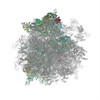 4d5lC  4d5nC  4d61C  4d67C C: citing same article ( M: map data used to model this data |
|---|---|
| Similar structure data |
- Links
Links
- Assembly
Assembly
| Deposited unit | 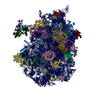
|
|---|---|
| 1 |
|
- Components
Components
+60S RIBOSOMAL PROTEIN ... , 43 types, 43 molecules ABCDEFGHIJLMNOPQRSTUVWXYZabcde...
-RNA chain , 3 types, 3 molecules 234
| #44: RNA chain | Mass: 1625917.625 Da / Num. of mol.: 1 / Source method: isolated from a natural source / Source: (natural)  |
|---|---|
| #45: RNA chain | Mass: 62616.344 Da / Num. of mol.: 1 / Source method: isolated from a natural source / Source: (natural)  |
| #46: RNA chain | Mass: 38385.750 Da / Num. of mol.: 1 / Source method: isolated from a natural source / Source: (natural)  |
-Details
| Has protein modification | Y |
|---|---|
| Sequence details | 4D5Y B 1 403 UNP P39023 RL3_HUMAN 1 403 4D5Y C 1 427 UNP P36578 RL4_HUMAN 1 427 4D5Y D 1 297 UNP ...4D5Y B 1 403 UNP P39023 RL3_HUMAN 1 403 4D5Y C 1 427 UNP P36578 RL4_HUMAN 1 427 4D5Y D 1 297 UNP P46777 RL5_HUMAN 1 297 4D5Y E 1 288 UNP Q02878 RL6_HUMAN 1 288 4D5Y F 1 248 UNP P18124 RL7_HUMAN 1 248 4D5Y G 1 266 UNP P62424 RL7A_HUMAN 1 266 4D5Y H 1 192 UNP P32969 RL9_HUMAN 1 192 4D5Y I 1 214 UNP P27635 RL10_HUMAN 1 214 4D5Y J 1 178 UNP P62913 RL11_HUMAN 1 178 4D5Y L 1 211 UNP P26373 RL13_HUMAN 1 211 4D5Y M 1 215 UNP P50914 RL14_HUMAN 1 215 4D5Y N 1 204 UNP P61313 RL15_HUMAN 1 204 4D5Y O 1 203 UNP P40429 RL13A_HUMAN 1 203 4D5Y P 1 184 UNP P18621 RL17_HUMAN 1 184 4D5Y Q 1 188 UNP Q07020 RL18_HUMAN 1 188 4D5Y R 1 196 UNP P84098 RL19_HUMAN 1 196 4D5Y S 1 176 UNP Q02543 RL18A_HUMAN 1 176 4D5Y T 1 160 UNP P46778 RL21_HUMAN 1 160 4D5Y U 1 128 UNP P35268 RL22_HUMAN 1 128 4D5Y V 1 140 UNP P62829 RL23_HUMAN 1 140 4D5Y W 1 157 UNP P83731 RL24_HUMAN 1 157 4D5Y X 1 156 UNP P62750 RL23A_HUMAN 1 156 4D5Y Y 1 145 UNP P61254 RL26_HUMAN 1 145 4D5Y Z 1 136 UNP P61353 RL27_HUMAN 1 136 4D5Y a 1 159 UNP P46776 RL27A_HUMAN 1 159 4D5Y b 1 159 UNP P47914 RL29_HUMAN 1 159 4D5Y c 1 115 UNP P62888 RL30_HUMAN 1 115 4D5Y d 1 125 UNP P62899 RL31_HUMAN 1 125 4D5Y e 1 135 UNP P62910 RL32_HUMAN 1 135 4D5Y f 1 110 UNP P18077 RL35A_HUMAN 1 110 4D5Y g 1 117 UNP P49207 RL34_HUMAN 1 117 4D5Y h 1 123 UNP P42766 RL35_HUMAN 1 123 4D5Y i 1 105 UNP Q9Y3U8 RL36_HUMAN 1 105 4D5Y j 1 97 UNP P61927 RL37_HUMAN 1 97 4D5Y k 1 70 UNP P63173 RL38_HUMAN 1 70 4D5Y l 1 51 UNP P62891 RL39_HUMAN 1 51 4D5Y m 1 128 UNP P62987 RL40_HUMAN 1 128 4D5Y o 1 106 UNP P83881 RL36A_HUMAN 1 106 4D5Y p 1 92 UNP P61513 RL37A_HUMAN 1 92 4D5Y t 1 137 UNP P46779 RL28_HUMAN 1 137 DBREF1 4D5Y u 1 210 UNP A0A087WNH5 DBREF2 4D5Y u A0A087WNH5_RABIT 1 210 |
-Experimental details
-Experiment
| Experiment | Method: ELECTRON MICROSCOPY |
|---|---|
| EM experiment | Aggregation state: PARTICLE / 3D reconstruction method: single particle reconstruction |
- Sample preparation
Sample preparation
| Component | Name: CRICKET PARALYSIS VIRUS IRES RNA BOUND TO MAMMALIAN 80S RIBOSOME AND ERF1 Type: RIBOSOME / Details: MICROGRAPHS SELECTED FOR ASTIGMATISM AND DRIFT |
|---|---|
| Buffer solution | Name: 20 MM TRIS PH 7.5, 100 MM KCL, 1 MM DTT, 2.5 MM MGCL2, 0.5 MM GTP pH: 7.5 Details: 20 MM TRIS PH 7.5, 100 MM KCL, 1 MM DTT, 2.5 MM MGCL2, 0.5 MM GTP |
| Specimen | Conc.: 1.38 mg/ml / Embedding applied: NO / Shadowing applied: NO / Staining applied: NO / Vitrification applied: YES |
| Specimen support | Details: HOLEY CARBON |
| Vitrification | Instrument: FEI VITROBOT MARK II / Cryogen name: ETHANE / Details: LIQUID ETHANE |
- Electron microscopy imaging
Electron microscopy imaging
| Experimental equipment | 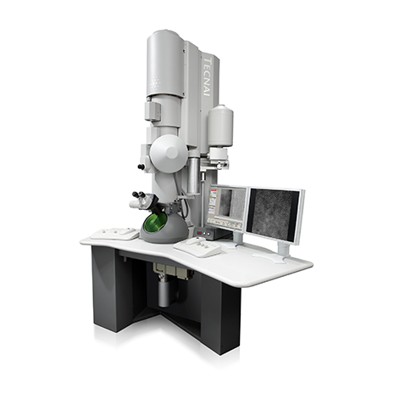 Model: Tecnai F20 / Image courtesy: FEI Company |
|---|---|
| Microscopy | Model: FEI TECNAI F20 / Date: Apr 17, 2012 / Details: IMAGES SELECTED FOR ASTIGMATISM AND DRIFT |
| Electron gun | Electron source:  FIELD EMISSION GUN / Accelerating voltage: 300 kV / Illumination mode: FLOOD BEAM FIELD EMISSION GUN / Accelerating voltage: 300 kV / Illumination mode: FLOOD BEAM |
| Electron lens | Mode: BRIGHT FIELD / Nominal magnification: 39000 X / Calibrated magnification: 65520 X / Nominal defocus max: 4000 nm / Nominal defocus min: 2000 nm / Cs: 2 mm |
| Specimen holder | Temperature: 77 K |
| Image recording | Electron dose: 20 e/Å2 / Film or detector model: KODAK SO-163 FILM |
| Image scans | Num. digital images: 366 |
| Radiation wavelength | Relative weight: 1 |
- Processing
Processing
| EM software |
| ||||||||||||
|---|---|---|---|---|---|---|---|---|---|---|---|---|---|
| CTF correction | Details: DEFOCUS GROUPS | ||||||||||||
| Symmetry | Point symmetry: C1 (asymmetric) | ||||||||||||
| 3D reconstruction | Method: MULTI-REFERENCE TEMPLATE MATCHING / Resolution: 9 Å / Num. of particles: 109596 / Nominal pixel size: 1.56 Å / Actual pixel size: 1.56 Å Magnification calibration: CROSS- -CORRELATION DENSITIES WITH REFERENCE STRUCTURE Symmetry type: POINT | ||||||||||||
| Atomic model building | Protocol: RIGID BODY FIT / Space: REAL / Details: METHOD--RIGID BODY | ||||||||||||
| Atomic model building | PDB-ID: 4CXD 4cxd Accession code: 4CXD / Source name: PDB / Type: experimental model | ||||||||||||
| Refinement | Highest resolution: 9 Å | ||||||||||||
| Refinement step | Cycle: LAST / Highest resolution: 9 Å
|
 Movie
Movie Controller
Controller


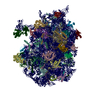

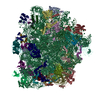

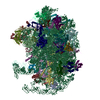
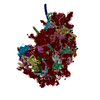

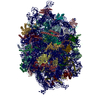
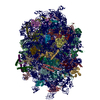

 PDBj
PDBj